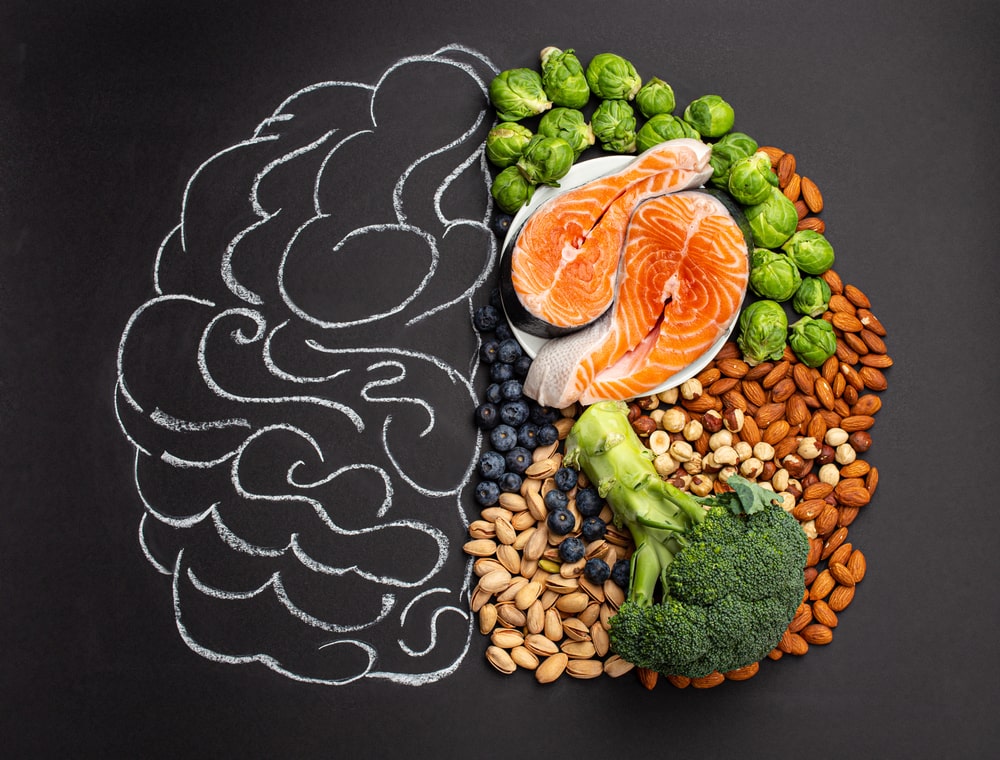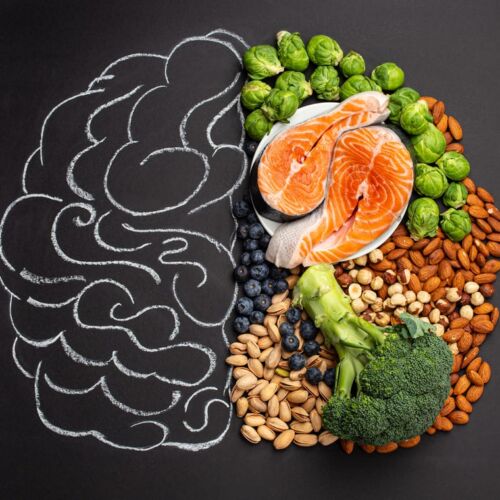The MIND Diet for Mental Health
by Pierrette HongChi

Mental health is an incredibly debilitating chronic disease for so many, and it continues to be on the rise. One in four live with a mental illness, and with rates higher than cancer, diabetes and heart disease, mental illness is the leading health concern worldwide. In Canada, the trend is similar with 18% aged 15 or older who met the diagnostic criteria mood, anxiety or substance use disorder in the previous 12 months, with mood (major depressive episode and bipolar disorder) and anxiety disorders (GAD and social phobia) more than doubling from 2012 to 2022, and with highest rates among young women. It is estimated that 1 in 2 Canadians will have or experience a mental illness by the age of 40 years. This means many, if not all, of us will either have, care for or live with someone having mental health challenges.
Nutrition is a well-known component of a healthy lifestyle, and improving our nutrition is crucial in the prevention and management of chronic disease. With a critical role on physical health, it makes sense that nutrition would also influence the physical health of the brain and thus its function. Brain function is a component of mental health and wellbeing. Thus, the impact of nutrition on our brain health needs to be a priority for us and our loved ones.
The Research on Nutrition and Mental Health
Pharmacology and psychotherapy are established methods of treatment for mental health disorders. However, the field of nutrition psychiatry, as an alternative method, has emerged in recent years. Nutrition psychiatry is the study and practice of integrating the role of food and food supplements as an unconventional method of treating mental health conditions. Both nutrition psychiatry and psychology have become popularized with the role of nutrition being recognized as an important consideration on mood and mental wellbeing in the mental health space . Nutrition therapy has been proposed as a concurrent and alternative therapy for treatment resistant cases, and is being considered in the treatment and/or prevention of mental illnesses.
The way in which nutrition can impact our brain health and function varies and is continues to be researched. Brain composition, structure and function depend on nutrients that are available.
Nutrients such as vitamins, minerals, lipids and amino acids, and thus impact the overall metabolism and function of the brain.
Communication occurs between the gut and brain; our gut health plays an important role in this communication pathway. This gut-brain axis is another way in which food and nutrition can impact our brain health and function. Much of how gut health impacts our brain health is explained through the health of the good gut bacteria and their ability to produce vital nutrients and neurotransmitters for optimal brain function .
Several nutrients have shown to have a specific role in brain health. These specific nutrients are specifically named and covered in this article. Rather than focusing on any one nutrient, a holistic approach to eating well for brain health can be implemented with a dietary pattern. A dietary pattern that has promising results for brain health and cognition, that is simple to follow and easy to monitor is The MIND Diet.
What is the MIND Diet?
The MIND Diet is a combination of two fairly well-known dietary patterns, the Mediterranean Diet and the DASH (Dietary Approaches to Stop Hypertension). And just as the diet title suggests, the MIND Diet is recommended as a dietary pattern for improving mental and brain health, specifically with regards to slowing cognitive decline. The diet is recommended for its positive effects on neurodegenerative changes and improvements in the function of the nervous system, and has shown some evidence around improving risks for cognitive decline and dementia from a recent systematic review. This review did report mixed results for brain outcomes, such as brain volume and pathology, however that authors acknowledge this may have been due to the limited number of studies looking at brain outcomes.
Research on the MIND Diet
The MIND Diet was introduced following the Rush University’s Memory and Aging Project (MAP) study in 2015 by Dr. Martha Clare Morris. The MAP study took place from 2004 to 2013, and included 923 participants. The research found a reduced risk of Alzheimer’s disease by 53% in those participants following the dietary pattern rigorously and a reduced risk of 35% in those following the diet moderately well.
Dr. Morris has published a book on the MIND Diet, titled The Official MIND Diet. The book outlines her background and research, and includes a 6-week plan for the MIND Diet. The book is co-authored by two other individuals: Dr. Morris’ daughter, Laura Morris – a professionally trained chef, certified personal trainer and certified nutrition consultant, and Jennifer Ventrelle, a registered dietitian, fitness trainer and meditation teacher. With the addition of these co-authors, the book also includes a number of recipes to help incorporate MIND Diet foods, and weight-loss guidance and strategies using the MIND Diet.
Why the MIND Diet?
While the original intention of the MIND Diet focused on the prevention and treatment of dementia and Alzheimer’s disease, some studies have looked at how the MIND Diet may positively improve anxiety and depression. Research on the MIND Diet has heavily focused on cognitive function and neurodegenerative diseases, however with the well-known benefits of the Mediterranean diet on mental health, and the simple recommendations of the MIND Diet – this diet has promising potential for overall mental health and wellbeing.
The MIND Diet has simple recommendations to follow that are can be flexible to incorporate to encourage sustainable dietary changes. The MIND Diet emphasizes the incorporation of 10 foods, and a limitation of 5 foods. These foods include:
| 10 foods to Include | 5 foods to limit |
| 1. Leafy greens
2. Other vegetables 3. Berries 4. Fish & seafood 5. Poultry 6. Nuts & seeds 7. Olive oil 8. Whole grains 9. Beans & Legumes 10. Wine |
1. Red meat & processed meats
3. Butter & Stick Margarine 4. Full fat cheese 5. Fried foods 6. Sweets, Pastries & Sweet Drinks |
The MIND Diet has a scoring system for you to track. The ability to score your food intake helps with ensuring we are staying on track, and can help to identify areas for improvement depending on your score each week. The MIND Diet is scored based on the recommended foods to include and limit as indicated above. Below is a copy of the MIND Diet tracker that can be used to record your score based on your weekly intake of those foods. Once scored, you can compare your risk for developing Alzheimer’s disease from the information provided.
A copy of a tracker can be downloaded here.
My top tips for including more of the 10 foods for the MIND Diet!
Leafy greens
- Add a handful of baby spinach or kale to a smoothie!
- Make stir-Frys with Asian greens like Bok Choy or Gai Lan, with or without other vegetables or proteins
- Get creative with salads – try different types of dressings and toppings to keep it interesting!
Other vegetables
- Have those favourite veggies washed, peeled and chopped on the ready to snack on!
Berries
- Always keep some in the freezer to
o Enjoy in a smoothie
o Heat and enjoy on pancakes or toast
o Add as a topping to some yogurt or cottage cheese
Fish and seafood
- Keep some canned fish handy to make a sandwich/wrap or to add to a salad
- Keep some in the freezer to make a quick meal because fish often does not take long to cook!
Poultry
- Prepare extra. Cooked chicken or turkey is easy to add to sandwiches/wraps or salads for lunches or for leftovers
Nuts and Seeds
- Store in the freezer to extend the shelf life
- Enjoy ¼ cup portion daily as a satisfying snack
- Add to oatmeal, overnight oats, yogurt
- Blend into smoothie for extra creaminess
- Choose natural nut butter spreads to replace butter on toast
Olive Oil
- Buy and use olive oil as your main source of fat for cooking and salad dressing
- Mix with your favourite type of vinegar for a bread dip to replace butter
Whole Grains
- Mix half and half, e.g., with brown rice or whole wheat pasta
- Explore other types of whole grains to replace your current go-to
Beans and Legumes
- Add a bit more and/or replace some or all the meat in your recipes
- Marinate in your favourite salad dressing to add to salads for some/extra protein
Wine
- Enjoy in moderation and understand the standard drink size and the current research on alcohol and the recommendation to limit
Pierrette HongChi is a registered dietitian located in Edmonton, Alberta. She provides nutrition counselling on diabetes, emotional eating, heart health, mental health, mindful eating, and weight loss. Pierrette can be found at https://www.pierrettehongchi.com/ for further information.
Images from: Unsplash and Pexels
The Site is not intended to be a substitute for professional advice. Under no circumstances will we be liable for any loss or damage caused by your reliance on information obtained through the Site. You are responsible for evaluating the accuracy, completeness, or usefulness of any information, opinion, advice, or other content available through the Site. Please seek the advice of professionals, as appropriate, regarding the evaluation of any specific information, opinion, advice, or other content. Never disregard professional advice, including medical advice, or delay in seeking it because of something you have read on this Site.


